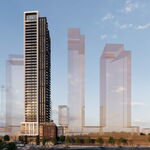The planning issues are real issues
Many American LRTs run in their own ROW. The Sacremento LRT, mostly in a separate ROW, had less ridership than the Finch West LRT on a 70 km system. Or Dallas, with 92,000 daily ridership on 150 km (!) of rail, also mostly on their own ROW.
and the speed doesn't only have to do with lots of stops, you also just cannot go as fast along a street as in a separate ROW.
It's not only about top speed, but also how much that speed costs. TSP costs nothing. Grade separation, on this corridor, would cost billions extra, and you'd have to eliminate stops on what is mostly a local corridor.
Hypothetically to the exact same places along the wide streets of Scarborough?
Rhetorical question. Of course that is where it should have gone.
Stop consolidation is fine - that's how every "express" service works - you can have buses still running on a corridor with subway. The insistence in Toronto of having rapid transit be both local and express leads to denser than necessary stop spacing on our older subway lines that make getting across the region a real pain, and now we are duplicating with LRT - but without the speed of the dedicated subway row in many cases.
Finch West doesn't need a subway line. Who would use it? Transfer from Y-U, ride three stops, then transfer to a local bus?
And how much would a subway cost?
I don't know about that - everyone brings up people not knowing about projects like Finch as a positive, but I really think it's a double edged sword. If they cancelled it tomorrow most of the same people also wouldn't know?
NIMBYs bring the price up and get things cancelled ... I suspect that a cancellation would bring more attention ("government cancels rail project, hundreds of millions wasted on nothing") but if 2018 Doug Ford didn't cancel this, I think it would have been fine.
"In line with European cities?" Most Euro cities have a large backbone metro and S train system - we do not currently have that in Europe. Our "LRT" is very American in flavor - just look at Houston, Portland, Minneapolis, Salt Lake City and on and on and on . . .
I'm mixed on this, but GO will be an S-Bahn by 2030 and the subway network is rapidly expanding. When I see American systems, I see low-frequency "suburban express" routes running on the path of least resistance (often segregated ROWs) with garbage connections and per km ridership far lower than the current 36 FINCH WEST. Out of the cities you mention, both Portland and SLC run on-street mainly in the downtown core.
I feel like not one single person here or really any urban planner has asked people why they don't use transit?
We have. Our conclusions are different than yours.
I'm not a fan of the SSE but look at the reality of people who want to go to STC. You have a seat and get to Kennedy, you have to go up 3 levels wait several minutes for the SRT (or future lrt) to arrive waiting in the cold or heat, and you're likely going to be standing the whole ride and you've added several mins to your trip and a vehicle change.
It's always about the $$$
Why are people so against, LRT's? Look at our existing ROW streetcars? I've spent 30 mins not seeing a streetcar on 512 despite the schedule being every 5 mins. A subway station is sheltered from the elements, and generally you'll hear an update if there is a delay or suspension.
Why is the 512 so bad? Is it because the TTC sucks [censored] at route management, and transit runs unreliably because of poor signal timing?
Toronto always seems to default to the most expensive option. Seemingly a collective failure of imagination?
Plus even with 100% signal priority most people who don't take transit (in Canada or the US) still wouldn't ride as what's the chance the place you're going to or from has good transit, and switching vehicles won't be a huge pain?
Which is why we want good transit to go as many places as possible ... a subway would require a transfer too.
If I'm going anywhere near downtown and it's north of Dundas, I'm just driving as I know transit will require at least 3 vehicles and a 15-20 min walk each way. Do you blame people for not getting out of their cars?
No, but again, that's why we need to consider what will allow us to make transit as convenient as possible with the $$$ we have been given by our political overlords
Plus SAFETY! Every time I've taken the ttc I've been or seen someone harassed by someone screaming and clearly out of their mind.
People here will argue back and forth about signal priority meanwhile people aren't taking transit because they feel unsafe or don't want to walk 20 mins to a stop.
"Safer" American systems that run garbage service (that make the TTC look good!) get high ridership because they're safe, right?




